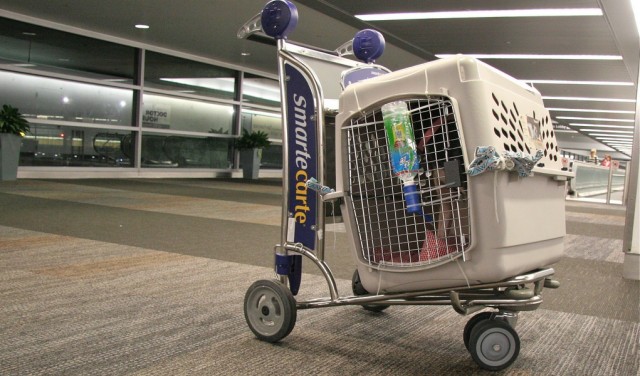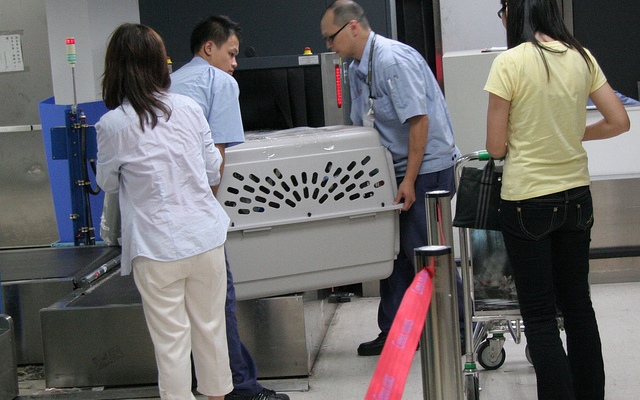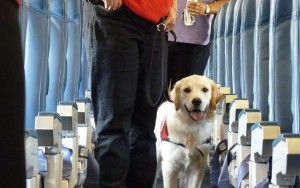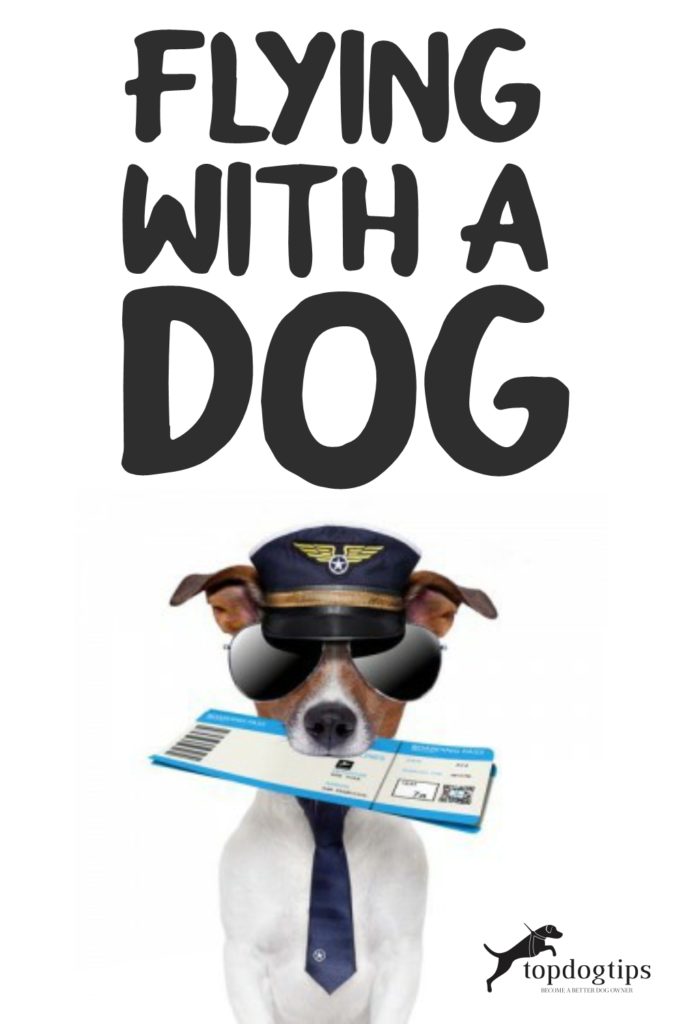
Table of Contents
- Flying With Dogs: Airline-Approved Dog Crates and Carriers
- Tips to make your flight as easy as possible
For many people, airports are not exactly fun.
From hauling your carry-on everywhere to traversing through the labyrinth that is TSA, flying can be quite taxing (though, of course, eventually rewarding).
Flying shouldn’t be a barrier to taking your pet with you when you travel, especially if you have airline-approved dog crates and carriers.
There are plenty of airline-permissible dog crates and carriers that you’re allowed to take on a flight with you while still maintaining your dog’s comfort.
However, before you take your dog on the plane with you, there are certain physical requirements to consider.
If your dog is small enough, she may be able to ride in the cabin with you, in an approved carrier, of course, but if she's too large, then you'll need to have her ride in the cargo hold.
Unfortunate but necessary.
“More and more now, families consider their pets to be members of the family and want to include them on trips. Unfortunately, airlines don't consider animals to be members of your family. They consider their cargo.” – Kirsten Theisen, Director of Pet Care Issues for the Humane Society of the United States

Though flying with your dog is certainly harmless, you should take precautions in order to prevent any type of injury to a sensitive animal.
For example, if you have a sick dog or a newborn puppy less than two months old, the dog cannot fly because of the health risks involved.
RELATED: 5 Best Airline-Approved Dog Carrier Brands
A few airlines sell their own pet carriers for flights, but you don't have to purchase your dog crate or carrier through them.
Numerous companies sell airline-approved carriers for dogs online, and you can even find them at your local pet store.
To avoid any disappointment, check with the airline that you and your Fido are flying with before you purchase a dog carrier.
It's possible that they will have additional special requirements on top of the standard and expected airline-approved dog crate and carrier rules.
* If you'd like more information about the specifics of traveling by air with your dog, you can read our column, Dog Travel 101: How to Ship a Dog by Plane.
It explains what you should do before, during, and after the flight to ensure your dog has the easiest travel experience possible.
It also includes great advice about what pet documents and pet supplies you should bring with you on your flight.

Flying With Dogs: Airline-Approved Dog Crates and Carriers
Safety is the top priority when choosing airline-approved dog crates and carriers.
Unfortunately, you won't get to make too many decisions yourself here because airlines are usually very strict and specific in terms of measurements and other requirements.
Make sure to read through the airline's specifications for dog crates and pet carriers to ensure that your pooch will be safe and well cared for during the trip.
You can find all this information by going to the website of the airline that you are flying with.
Here are a few examples of the requirements posed by the airlines:
- Delta's pet travel requirements & restrictions page
- United's pet kennel types and requirements
- Alaska Air's pet travel requirements
- US Airways' pet policy
Thinking size-wise before you hit the skies
Once you’ve gone through all the tasks you need to indicate in our previous article, evaluate the risks.
Then, decide that your pet is well enough to travel.
The next step is to choose your airline-approved dog crates or carriers that will house your Fido comfortably during the flight.
The way to prepare for your trip will likely depend on whether or not your pet is traveling in the cabin or cargo hold.
Usually, airlines with larger planes accept live animals and keep them in a pressurized, temperature-controlled area.
Commuter flights may not allow live animals into the cargo hold, and there are even some bigger airlines (AirTran, Southwest, JetBlue, Virgin, and Frontier) that don’t allow pets as cargo at all, meaning that you have to keep them in the cabin.
* Remember that all pet crates and carriers must comply with the International Air Transport Association’s (IATA’s) rules and regulations.
A quick tip: You’re responsible for obeying the laws of not only the country you’re leaving but also the one you are entering when it comes to traveling with pets.
Your dog will need enough room to move around comfortably in her crate or carrier.
Be sure she has plenty of space to stand up, lie down, and turn around comfortably.
This is true for both crates and carriers.
At the same time, you don't want your dog to have so much space that she is being thrown all over the place while the crate is moved in flight.
Read the sizing guidelines on the crate or carrier that you are buying, and be sure that it is suitable for your pet.

Airline-approved dog crates and carriers for pets traveling as cargo
According to the IATA, two animals can share the same crate if they are both under thirty pounds.
Also, the animals have to be compatible and of the same species (a loud, snarling dog-and-cat fight is not welcomed by airlines).
Otherwise, there could be serious consequences for both pets.
When you travel with dogs by air, your pet crate needs to be extremely durable in that it must have a heavy door made of plastic, metal, or any other strengthened material, a non-collapsible design, and – as it happens in many cases – cable ties in the corners of the dog crate.
Likewise, the floor of the crate must be leak-proof and have a strong locking system (spring-loaded and preferably metallic).
RELATED: Tips for Traveling with Your Dog
Your airline-approved dog crate needs to have ventilation on two sides and food and water bowls that are attached.
This is not only to ensure there aren’t any spills or messes if the flight hits turbulence but also to maintain your pet’s comfort.
Similarly, as a way to guard against turbulence, the crate should not have wheels.
Place “LIVE ANIMAL” stickers on the outside of your dog's crate to alert handlers to carry the crate with caution.
Also, include your contact information and the name of your pet on the crate in case something happens.
When it comes to removing the dog from the aircraft, there should be bars on the side of the crate for handling purposes, and if your dog weighs more than 130 pounds, the crate needs to have space to accommodate a forklift or hand cart.
Carriers should be made from a sturdy material with a bottom that doesn’t leak yet is comfortable for your pet to sit in.

Amazon's most popular airline-approved dog crates for the cargo hold:
- PETMATE VARI KENNEL 90-125lbs
- Aspen Pet Porter Travel Kennel
- Petmate Sky Kennel Pet Carrier
- Sport Pet Designs Plastic Kennel
- Amazon Basics 2-Door Top Load Hard-Sided Carrier
Personally, I like reading other dog owners' reviews on the product before purchasing.
I'm addicted to being influenced by dog product reviews.
However, this practice has saved me a lot of money and plenty of my pets' health over the years.
I would strongly advise reading the customer reviews for every one of these airplane kennels before purchasing.
During my research for some of the top most popular airline-approved crates, we've noticed some great advice from customers on how to guarantee your crate is truly airline-approved.
Here's a good example of one of those useful kennel reviews (full review here):
“If you are taking your pet on an airline, this is the only pet crate we could find that was true “Airline Approved”…“
The more reviews you can read, the better idea you'll have on what type of crate or carrier you need for your dog when planning a flight together.
Expensive doesn't always mean the best, and there are certainly many cheaper options that are just as likely to be approved for the flight with your pet.
Airline-approved dog crates and carriers for pets traveling in the cabin
Obviously, you can only fly with a small dog in the cabin.
All of the US’s major airlines allow people to fly with a dog, much in the same way that parents can travel with their babies.
Puppies, once again, shouldn’t fly.
However, your dog needs to be small enough so that her carrier will fit under the seat, and she should probably weigh less than 15 pounds.
Examples of breeds that are small enough to fit this recommendation include:
- Chihuahuas
- Pomeranians
- Brussels Griffon
- Japanese Chin
- Yorkshire Terriers
…and any toy dog breed that will be comfortable size-wise in a very small space.
In order to prevent your dog from barking and not handling the flight well, make sure she is comfortable by using the carrier numerous times before taking her on the plane.
Use it for something other than going to the vet, your dog's groomer, or any other place that may give your dog anxiety.
Try taking your Fido to the dog park, out for a walk, or to doggy daycare in the recently purchased airline-approved pet carrier to show her that these contained spaces mean she is going somewhere FUN.
Begin preparing for this as early as possible before the flight with a dog in order to make sure the association is made that a carrier is a positive place for her.
Amazon's most popular airline-approved dog crates for the cabin:
- Paws & Pals Soft Pet Carrier
- Sherpa Delta Deluxe Pet Carrier
- Bergan Comfort Carrier Soft-Sided Pet Carrier
- Sherpa Original Deluxe Pet Carrier
- Henkelion Carrier for Pets
Note that some manufacturers of dog crates provide certain guarantees that their crates will be 100% allowed into the cabin by the airline.
For example, with Sherpa's carriers, you can get the Small and Medium Original Deluxe that will have a label of Guaranteed On Board®, meaning you can be sure these won't cause trouble.
However, their Large Original Deluxe dog carrier is only “approved” for use on most major domestic airlines, and you do not receive the above-mentioned guarantee.
Here's more on that from the manufacturers themselves (taken from their Amazon product page):
“Approved” for use on Major Airlines means:
- Provides adequate ventilation
- Is leak-proof
- Safely encloses the pet
- Conforms to under-seat dimensions
Thus, you need to be very particular about the kind of airline-approved dog crates and carriers you choose because some of them might go through, while with others, you get a guarantee that there will be no issues.
We're not affiliated with Sherpa®, but they are one of the few manufacturers that provide this type of labeling and guarantees.
* If you're ever refused to have your pooch boarded with one of their carriers, you can call up Quaker Pet Group, and they will reimburse you for the flight ticket and the pet fee, no questions asked.
When purchasing Sherpa's dog carrier, do this:
- Go to flygob.com
- Select the participating airline
- Enter the flight info, carrier info, and pet info
- Print and sign the forms and present them when boarding
Look around for other manufacturers who might have the same program in place.
The more guarantees you can secure for yourself and your pooch, the calmer you're going to feel when preparing for the flight.
RELATED: Five Best Dog Travel Crates for Long Trips
Service dogs on commercial flights
Trained service dogs can be taken in the cabin with passengers as long as the appropriate documentation is provided.
Many people purchase service dog harnesses and put them on ordinary canines to get them into non-dog-friendly areas, but that won't work with airlines (it's also illegal!)
Airlines require proper documentation of the dog's training and qualifications to be provided before you can go through security.

Larger service dogs can travel in front of the passenger in the floor space in front of their seat but are not allowed to protrude into the aisle or to move around the cabin.
Smaller animals can travel in airline-approved dog crates and carriers or use the floor space in front of their handler.
Just like with ordinary dogs, flying rules and requirements for service animals will be different with every airline, so you'll have to make sure you check with the airline you're flying with before you book your ticket.
Most airlines do not consider dogs in training or therapy dogs to be service dogs.
These canines would have to be treated like ordinary pets and follow the rules accordingly.
RELATED: 18 Best dog-friendly hotels in the USA
Also, remember that if you bring a service dog with you, they will have to travel through the airport and go through all the same security checks as a human.
According to the Transportation Security Administration, an agent will inspect the dog and the dog’s belongings, including her collar, harness, leash, backpack, vest, etc.
Although the canine's harness will not be removed, it and all other items your pooch may have on her, such as a backpack, are subject to screening.
Tips to make your flight as easy as possible
There are other handy tips and tricks to ensure that your pet is comfortable.
For starters, make your flight reservations early, and do NOT attempt to smuggle your dog onto the plane because you will get caught by TSA.
You must also get a dog health certificate from the vet that says your pet is healthy enough to fly.
Do these several weeks before you get on the flight.
Many airlines require this documentation before your dog can board the flight.

Flying can be a little frightening for a dog who isn’t used to the whole process, especially altitude changes.
You should include a piece of clothing in her crate or carrier that has your smell on it to reassure your Fido in case she gets scared.
You probably won’t be able to take your dog out of the carrier on the flight and hold her on your lap, but you can put your hand in the dog’s carrier and allow her to sniff it so she knows you’re nearby.
Dogs with flat faces, also known as Brachycephalic dog breeds, are more susceptible to problems while flying because of their facial structure, according to the American Veterinary Medical Association.
Examples of breeds with these “pushed-in” faces are Pugs, Bulldogs, Boxers, and Boston Terriers. In certain cases, the airline may not even allow these dog breeds to travel.
RELATED: Costs of shipping dogs by air
Also, be cognizant of the temperature—depending on where you’re traveling, it may be too cold or too hot to fly with your pet—and try to book a nonstop flight, as flight changes may be disruptive or alarming to your pet.
According to the AVMA, sedating or tranquilizing your pet before a flight is NOT a good idea because that medication can cause respiratory and heart problems in conjunction with air travel.
Flight constraints aren’t keeping dog owners and their pets separated on fun vacations anymore.
As flight technology has improved, it has become increasingly common for pet owners to take their dogs into the skies with them and enjoy a fun vacation with the entire family.
Just be sure to select the right airline, check the rules, buy high-quality airline-approved dog crates and carriers for your pet, and do all this well in advance.
This will ensure a safe, happy, and stress-free flight for you and your dog.
Want To Share This…
Disclosure: We may earn affiliate commissions at no cost to you from the links on this page. This did not affect our assessment of products. Read more here and find full disclosure here.
















